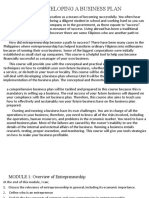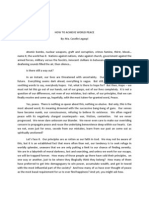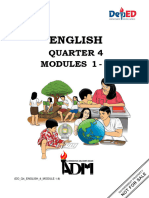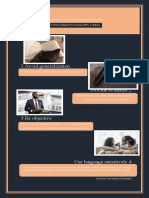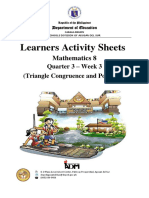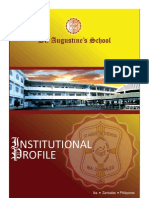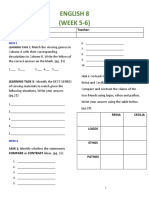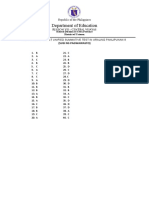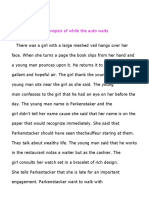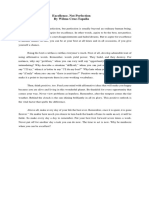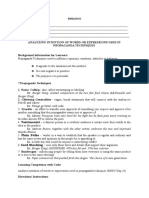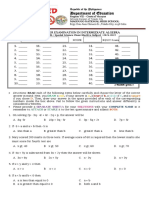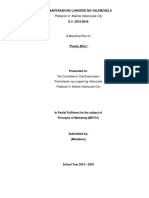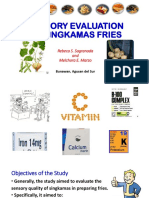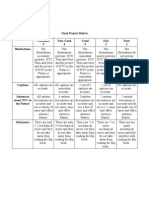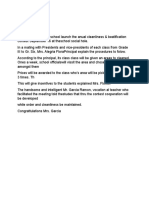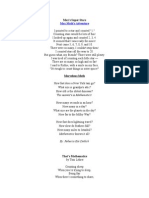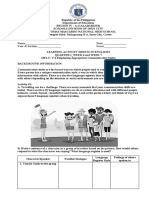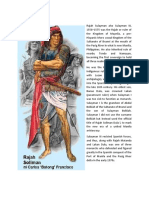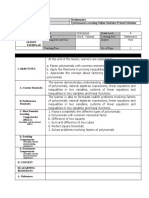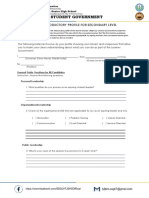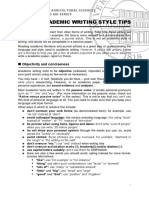Professional Documents
Culture Documents
Brown Minimalist Tips Skincare Infographic PDF
Brown Minimalist Tips Skincare Infographic PDF
Uploaded by
Jonna Mae AlmendrasOriginal Description:
Original Title
Copyright
Available Formats
Share this document
Did you find this document useful?
Is this content inappropriate?
Report this DocumentCopyright:
Available Formats
Brown Minimalist Tips Skincare Infographic PDF
Brown Minimalist Tips Skincare Infographic PDF
Uploaded by
Jonna Mae AlmendrasCopyright:
Available Formats
01
TIP #1: ALWAYS USE THIRD-PERSON POINT OF VIEW
To avoid bias in your writing, always use the third
person point of view. First-person plural pronouns,
such as “we,” “our,” and “us,” should be reserved for
fiction writing. These pronouns give the impression
that you and your audience have had the same
experience and came to the same conclusion. This is
not always the case. Use third-person pronouns in
your writing instead.
02
TIP #2: WHEN MAKING COMPARISONS, USE
WORDS THAT DO NOT REFLECT YOUR FEELINGS
Compare and contrast pieces can be filled with bias if you are
not careful. You need to choose the words you use in your
writing so that the reader does not feel like they are reading
your personal opinions. Words like “bad,” “better than,” “worse
than,” “normal,” “ordinary” and so on, present the reader with
your bias. Instead, use words or phrases that put the two
things you are comparing on equal footing. Use facts instead
of feelings when comparing things in your writing.
03
TIP #3: BE SPECIFIC WHEN WRITING
ABOUT A GROUP OF PEOPLE
When writing about groups of people, you can avoid bias
by being as specific as possible. Use age ranges instead of
a general term (“aged 65 and over” vs. “senior citizens”).
Use the specific culture or ethnicity. Use male or female.
The more specific you are in your writing, the less chance
there is of your reader misunderstanding the group you
are talking about and taking offense.
You might also like
- Entrepreneurship Book by DiwaDocument211 pagesEntrepreneurship Book by Diwamara ellyn lacsonNo ratings yet
- How To Achieve World PeaceDocument2 pagesHow To Achieve World PeaceRominne Bautista100% (2)
- Application Letter AteneoDocument2 pagesApplication Letter AteneoReden DumaliNo ratings yet
- Grade 7 ExamDocument3 pagesGrade 7 ExamMikko GomezNo ratings yet
- FINALIZED ASSESSMENT TOOL - English 8 ANSWEREDDocument8 pagesFINALIZED ASSESSMENT TOOL - English 8 ANSWEREDKimberly Ann Castro VitugNo ratings yet
- English 8 Q4 ModuleDocument38 pagesEnglish 8 Q4 ModulecesianeNo ratings yet
- Learning Task 5: Read The Graphical Representation and The Text Below. in Your Notebook, Answer The Questions That FollowDocument1 pageLearning Task 5: Read The Graphical Representation and The Text Below. in Your Notebook, Answer The Questions That FollowCasio Karl D.100% (1)
- Infographic On Avoiding Biased WritingDocument1 pageInfographic On Avoiding Biased WritingFranco MiguelNo ratings yet
- Math8 Q3 LAS Week-3-4 PDFDocument26 pagesMath8 Q3 LAS Week-3-4 PDFJohn Paul G. LugoNo ratings yet
- Institutional Profile of St. Augustine's School, Iba, ZambalesDocument7 pagesInstitutional Profile of St. Augustine's School, Iba, Zambalesrinlacer100% (5)
- Parent-Teacher-Community Association (Ptca) As School PartnerDocument4 pagesParent-Teacher-Community Association (Ptca) As School PartnerEvan BraziNo ratings yet
- ENGLISH 8 Answer SheetDocument2 pagesENGLISH 8 Answer SheetYayen Magtibay ManaloNo ratings yet
- AP-8-District Unified Summative Test Answer KeyDocument1 pageAP-8-District Unified Summative Test Answer KeyJoy Valerie100% (1)
- Grade 8 Q2 English LASDocument86 pagesGrade 8 Q2 English LASKarla Javier PadinNo ratings yet
- Synopsis of While The Auto WaitsDocument4 pagesSynopsis of While The Auto WaitsRodmar EscolanoNo ratings yet
- Oration Excellence Not Perfection 2019Document1 pageOration Excellence Not Perfection 2019Loraine Segumalian100% (1)
- 2nd Quarter Week 1Document14 pages2nd Quarter Week 1marineth casquejoNo ratings yet
- Activity Sheet 1Document4 pagesActivity Sheet 1Reinopeter Koykoy Dagpin LagascaNo ratings yet
- Las Q3 Melc2 KbtanDocument5 pagesLas Q3 Melc2 KbtanYuri Ichika100% (1)
- Amado V. HernandezDocument3 pagesAmado V. HernandezMark Daniel ManaliliNo ratings yet
- First Quarter Exam in Elective Math 8 Sy20212022Document4 pagesFirst Quarter Exam in Elective Math 8 Sy20212022Joshua BarontoyNo ratings yet
- Pamantasan NG Lungsod NG Valenzuela: Poblacion II, Malinta Valenzuela CityDocument21 pagesPamantasan NG Lungsod NG Valenzuela: Poblacion II, Malinta Valenzuela CityJhenry Nicole ManeroNo ratings yet
- Sensory Evaluation of Singkamas Fries: Rebeca S. Sagranada and Melchora E. MarzoDocument11 pagesSensory Evaluation of Singkamas Fries: Rebeca S. Sagranada and Melchora E. MarzoChoy Concha Albasin Eugenio-MarzoNo ratings yet
- Flipbook RubricDocument1 pageFlipbook Rubricsewai79100% (3)
- The PNU Elementary School Launch TheDocument2 pagesThe PNU Elementary School Launch TheJapeth PurisimaNo ratings yet
- LET - Keisha Gabrielle Rabano 1Document2 pagesLET - Keisha Gabrielle Rabano 1Keisha Gabrielle RabanoNo ratings yet
- Math PoemsDocument7 pagesMath PoemsNeric Ico MagleoNo ratings yet
- Mark Jaranilla Esp Module Week 3 4 q4Document18 pagesMark Jaranilla Esp Module Week 3 4 q4Mark Jaranilla100% (1)
- Midterm Examination in Oral Communication (Humss 11-Pascal) : Bayugan City, 8502 CARAGA PhilippinesDocument2 pagesMidterm Examination in Oral Communication (Humss 11-Pascal) : Bayugan City, 8502 CARAGA PhilippinesChel MaglanqueNo ratings yet
- English G10 2nd Grading ExamDocument4 pagesEnglish G10 2nd Grading ExamJerome Manaig SueltoNo ratings yet
- Notes 2 EnglishDocument2 pagesNotes 2 EnglishHaydee FelicenNo ratings yet
- His Airness by Mike Greenberg May 29, 2014: AdvertisementDocument2 pagesHis Airness by Mike Greenberg May 29, 2014: AdvertisementEdsel Roy Vega HormachuelasNo ratings yet
- Social Studies Major - Set A - Part 2Document6 pagesSocial Studies Major - Set A - Part 2Edward Allen Bulanadi ManalotoNo ratings yet
- Why SinigangDocument2 pagesWhy SinigangJudy Ann Oliveros Dumrique100% (1)
- Grading System SY 2022 2023Document3 pagesGrading System SY 2022 2023Wynnie RondonNo ratings yet
- Reading and Revolution Objectives: To Give Knowledge About What Happened in The Past and How It Affects The Present. Introduction: ReadingDocument5 pagesReading and Revolution Objectives: To Give Knowledge About What Happened in The Past and How It Affects The Present. Introduction: ReadingMary Shine Magno MartinNo ratings yet
- Brendell T. Madali Licensed Professional Teacher SkillsDocument4 pagesBrendell T. Madali Licensed Professional Teacher SkillsEDWIN MASICATNo ratings yet
- Excuse Letter FormatDocument7 pagesExcuse Letter FormatLeonina Mendoza DelicaNo ratings yet
- Reaction PaperDocument3 pagesReaction PaperDanika S. Santos100% (1)
- Table of Contents (Saint Columban College Junior High School Department - Pagadian City)Document1 pageTable of Contents (Saint Columban College Junior High School Department - Pagadian City)Quenie EspinuevaNo ratings yet
- The BalladDocument35 pagesThe BalladDivine SanzNo ratings yet
- English 10 (Week 3) (Vibal)Document13 pagesEnglish 10 (Week 3) (Vibal)Jubylyn AficialNo ratings yet
- LAS-ENGLISH-QUARTER 1 - WEEK 6-And WEEK7Document4 pagesLAS-ENGLISH-QUARTER 1 - WEEK 6-And WEEK7Jek EstevesNo ratings yet
- ENGLISH 8 - Q4 - Wk6 - USLeM RTPDocument11 pagesENGLISH 8 - Q4 - Wk6 - USLeM RTPMonica PolicarpioNo ratings yet
- Trigonometrically Proportional: Grade 9Document10 pagesTrigonometrically Proportional: Grade 9Marie Del CorpuzNo ratings yet
- Dream Community Existing CommunityDocument3 pagesDream Community Existing CommunityMeycauayan National High School67% (3)
- Reviewer For Grade 8 Ict 3RD QuarterDocument5 pagesReviewer For Grade 8 Ict 3RD QuarterAmelia Ria CanlasNo ratings yet
- Rajah SulaymanDocument1 pageRajah Sulaymanmickaaa11No ratings yet
- Which of The Following Is NOT True About Dust?Document3 pagesWhich of The Following Is NOT True About Dust?lucel palaca100% (1)
- Science Prevention Is Better Than CureDocument3 pagesScience Prevention Is Better Than CureGabby CabanesNo ratings yet
- BANGALAO-Solid & Waste Management BrochureDocument1 pageBANGALAO-Solid & Waste Management Brochurejuneroden bangalaoNo ratings yet
- Lesson Exemplar in MathematicsDocument6 pagesLesson Exemplar in MathematicsNeo Banayo VillarealNo ratings yet
- Makato and The Cowrie ShellDocument6 pagesMakato and The Cowrie ShellJoan Tajale de Guzman100% (1)
- Proper Format - Introductory ProfileDocument1 pageProper Format - Introductory ProfileStefani ApalisokNo ratings yet
- Final Selections For Post Reading Test SecondaryDocument12 pagesFinal Selections For Post Reading Test SecondaryRoselyn LlimitNo ratings yet
- Kasaysayan NG PgmnhsDocument1 pageKasaysayan NG PgmnhsFay Villanueva ValenzuelaNo ratings yet
- 402 Formal Definition PDFDocument2 pages402 Formal Definition PDFKhaye Dela Cruz100% (1)
- Academic Writing Style TipsDocument3 pagesAcademic Writing Style TipsLonewolf WarriorNo ratings yet
- Formal Academic WritingDocument2 pagesFormal Academic WritingWahyu Sendirii DisiniiNo ratings yet
- Business LetterDocument24 pagesBusiness LetterNinaNo ratings yet
